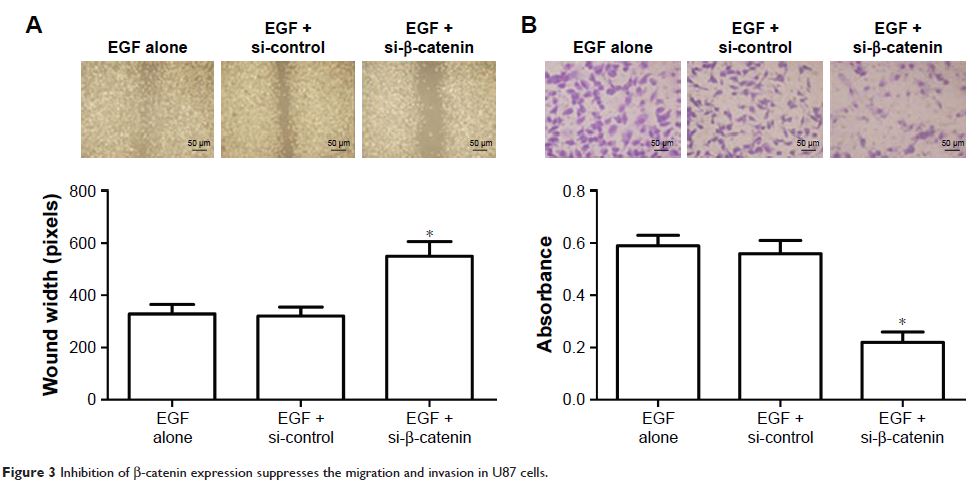103855
论文已发表
提 交 论 文
注册即可获取Ebpay生命的最新动态
注 册
IF 收录期刊
- 3.4 Breast Cancer (Dove Med Press)
- 3.2 Clin Epidemiol
- 2.6 Cancer Manag Res
- 2.9 Infect Drug Resist
- 3.7 Clin Interv Aging
- 5.1 Drug Des Dev Ther
- 3.1 Int J Chronic Obstr
- 6.6 Int J Nanomed
- 2.6 Int J Women's Health
- 2.9 Neuropsych Dis Treat
- 2.8 OncoTargets Ther
- 2.0 Patient Prefer Adher
- 2.2 Ther Clin Risk Manag
- 2.5 J Pain Res
- 3.0 Diabet Metab Synd Ob
- 3.2 Psychol Res Behav Ma
- 3.4 Nat Sci Sleep
- 1.8 Pharmgenomics Pers Med
- 2.0 Risk Manag Healthc Policy
- 4.1 J Inflamm Res
- 2.0 Int J Gen Med
- 3.4 J Hepatocell Carcinoma
- 3.0 J Asthma Allergy
- 2.2 Clin Cosmet Investig Dermatol
- 2.4 J Multidiscip Healthc

EGF-β-catenin 信号在人胶质母细胞瘤的上皮间质转化中的关键作用
Authors Wang X, Wang S, Li X, Jin S, Xiong F, Wang X
Received 5 April 2017
Accepted for publication 5 May 2017
Published 31 May 2017 Volume 2017:10 Pages 2781—2789
DOI http://doi.org/10.2147/OTT.S138908
Checked for plagiarism Yes
Review by Single-blind
Peer reviewers approved by Dr Akshita Wason
Peer reviewer comments 3
Editor who approved publication: Dr William Cho
Abstract: To date, β-catenin has been reported to be implicated in mediating the
epithelial-mesenchymal transition (EMT) in a variety of human cancers, which
can be triggered by EGF. However, the mechanisms underlying EGF-β-catenin
pathway-induced EMT of glioblastoma multiforme (GBM) have not been reported
previously. In the present study, immunohistochemistry, reverse transcription
polymerase chain reaction, and Western blot were applied to investigate the
effect of EGF-β-catenin pathway on EMT of GBM. Here, we identified that
β-catenin mRNA and protein levels were up-regulated in GBM tissues and four
kinds of glioblastoma cell lines, including T98G, A172, U87, and U251 cells,
compared with normal brain tissue and astrocytes. In U87 cell line, inhibition
of β-catenin by siRNA suppressed EGF-induced proliferation, migration,
invasiveness, and the expression of EMT activators (Snail and Slug). In
addition, the expression of epithelial markers (E-cadherin) was up-regulated
and the expression of mesenchymal markers (N-cadherin and MMP9) was
down-regulated. Finally, inhibitor of PI3K/Akt signaling pathways inactivated
the EGF-β-catenin-induced EMT. In conclusion, β-catenin-EMT pathway induced by
EGF is important for GBM progression by the PI3K/Akt pathways. Inhibition of
β-catenin leads to suppression of EGF pathway-induced EMT, which provides a new
way to treat GBM patients.
Keywords: EGF, β-catenin, EMT, GBM
